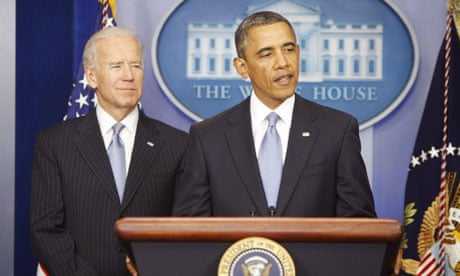The fiscal cliff was averted last week as both the House and Senate agreed on an imperfect package. What do Americans think of this legislation and those who passed it?
Many in Washington did not think a deal would be reached, but Americans expected Congress would hammer out an agreement on time.
In every single Gallup poll taken during the month of December, the majority of respondents guessed that Congress would reach a solution that avoided the cliff. That majority shrank to 50%, but still held as late as 22 December, despite pessimistic reports. The ability of the public to predict better than most pundits fits with research that shows Americans also do a very good job of forecasting the results of presidential elections.
But while most Americans expected a deal, they didn't much like it. By a slim 45% to 43% plurality, Gallup found more Americans disapproved than approved of the fiscal cliff deal. This broadly concurs with Pew Research's finding that 38% approved and 41% disapproved of the deal. The percentage of Americans who registered agreement is far less than the 68% of Americans who'd said they wanted "compromise" from their Washington leaders back in December.
Independents and Republicans, in particular, looked for agreement – just not this one. Only 27% of Republicans and 39% of independents approved of the passed fiscal cliff legislation per Gallup. That compares with the approximately 60% of each group who had wished Congress to pass "compromise" legislation in December. Meanwhile, the 67% of Democrats who approved of the fiscal cliff deal largely matches the approximately 70% of Democrats who wanted a bipartisan piece of legislation.
The reason for this before-and-after discrepancy, as Pew Research discovered, is that 57% of Americans think President Obama got more of what he wanted, while only 20% feel the same way about Republican leaders. That affirms the fiscal cliff legislative rollcall, in which, by a near 2:1 margin, House Republicans opposed the law, while House Democrats approved it by more than a 9:1 margin.
That's not to say Republican leaders made a mistake compromising, in the eye of the public. The percentage of Americans who approved of generic congressional Republicans' handling of the fiscal cliff negotiations had been stuck in the 20s throughout the process. This percentage reached a low of 25% per Gallup and 19% per Pew, after the deal was passed.
Yet, Republican House speaker John Boehner who, despite much protestation from his own caucus, managed to get the deal through the House, actually received a boost in his approvals: 31% of Americans approved of Boehner's handling of the fiscal cliff deal in Gallup polling – higher than any other congressional leader.
For Senate Republican leader Mitch McConnell, who played a leading role, with Vice-President Joe Biden, in crafting the final form of the fiscal cliff bill, approval of 28% was also higher than the generic Republican congressional approval. In both cases of these named Republican leaders, the net approval (approval minus disapproval) of about -20pt is about 20pt higher than the net approval of generic congressional Republicans, at -40pt per Gallup.
Some might say that named Republican leaders only have higher approval because it's easier to hate a no-faced person, but I'm not sure I agree. Only 27% approved of Senate Democratic leader Harry Reid's performance in Gallup's polling, which is slightly lower than the percentage of Americans who approved of named Republican leaders. It's also lower than the 34% who approved of the generic Democratic leaders in Congress. It does seem that Americans are willing to reward both the Democratic party they saw as more compromising and the Republican leaders who showed a willingness to compromise.
The ability to compromise is also probably part of the reason that President Obama has consistently received the highest ratings on the fiscal cliff negotiations from Americans: 46% of Americans approved of Obama's handling of the fiscal cliff negotiations, while 48% disapproved. That approval is slightly down from earlier, though the -2pt net split is about 20pt better than those of our named congressional leaders. Given that Pew Research has the split at 48-40 for the president, I'm guessing that this is mostly statistical noise. Obama, of course, had been hounded from some on his own side for being too compromising on the fiscal cliff deal. Vice-President Biden, who took the lead with McConnell on final negotiations, also had a -2pt approval/disapproval split, with approval at 40% and disapproval at 42% per Gallup.
Indeed, Americans may be split on the overall bill and may not love those who compromised – but they like the compromisers more than those who stuck to their guns. In other words, voters expect their leaders to be adults and make deals. Further, American "optimism" in avoiding the fiscal cliff was rewarded. We will have to wait to see whether Americans will be as positive when it comes to predicting the outcome of the political battle over the debt ceiling in the next few months.
